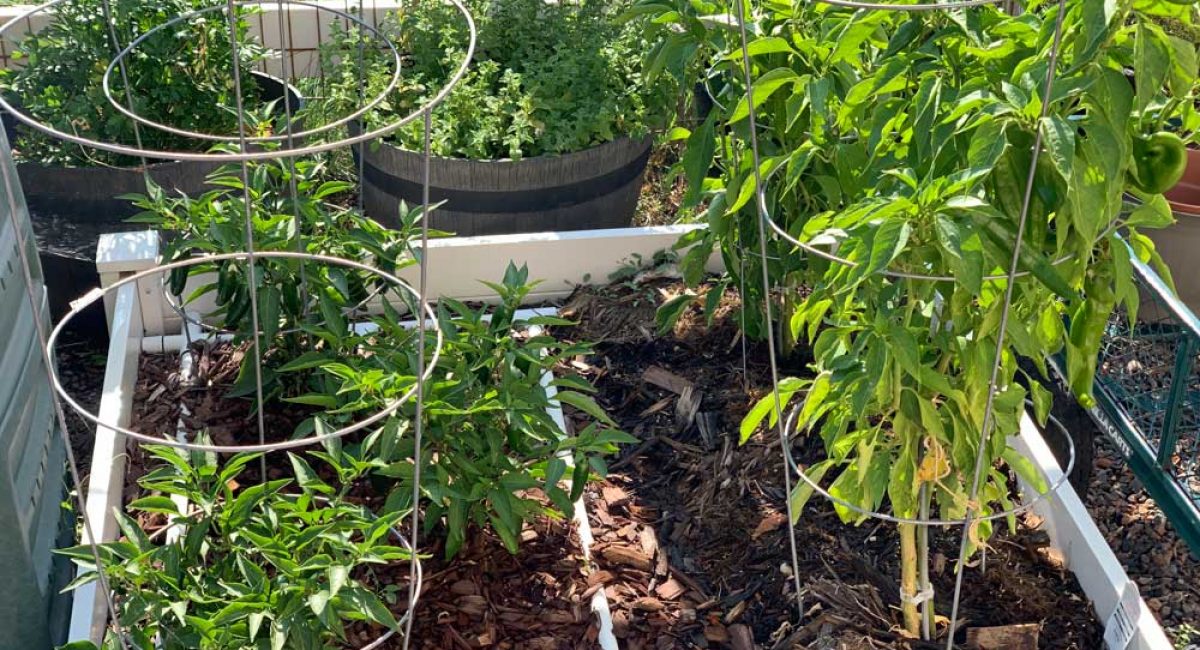
By Sara
Are you considering planning a vegetable garden to fuel your plant-based lifestyle this summer? If so, it’s nearly time to get outside and get your hands dirty! By planting your vegetable garden, that is!
Here are some things to consider as you get started coming up with your plan:
Tips:
- First of all, use raised beds for maximizing garden space while minimizing compaction of the soil, making for happier and healthier roots. Raised beds can be equipped with watering solutions or drip systems to make their care easier on you and the plants!
- Secondly, if you are able to do a drip system to water this is best. If not, try to water in the morning so that by evening the leaves of the plants are dry and plant fungus doesn’t become a problem. Don’t forget to add a thick layer of mulch over the soil to help keep the moisture in the soil. This will also keep it cooler in the hot months and warmer in the cold months!
- Thirdly, if you compost and have some compost ready to fertilize your garden area, add this to your soil to add organic matter that will help to feed the soil, making it more fertile for your veggies! Try adding earthworm castings, these are great for soil fertility.
- Next, get some tall, sturdy trellises or cages for your veggies, you can use your square footage more efficiently, by growing up, not out. I’ve had great luck growing zucchini and cucumbers this way. I am going to try eggplant and squash this year in this manner also.
- Above all, make sure to rotate your crops so that the soil isn’t continuously being depleted of certain nutrients by the same plants over and over. This will help to keep your soil healthy and the organisms growing in the soil happy.
- Finally, learn about companion planting, and how best to utilize this. You can use taller plants to shade plants like lettuces and use certain herbs and flowers to repel pests. I am trying basil next to tomatoes and chives around the perimeter of my carrots this year. I am also going to plant some wildflowers to encourage the pollinators nearby.
“Health is the first form of wealth, invest in yours by eating whole, unprocessed foods.”
— Dr. Axe
New to gardening?
If you are new to gardening, there are some plants which are easier to grow to get you started. Some examples include: lettuce, tomatoes, cucumbers, root vegetables (carrots, radishes), pumpkin and zucchini.
The heirloom varieties of veggies seem to have the most robust flavors, and are my favorites! Herbs make your salads and cooking so much more flavorful, so consider planning some of these as well.
So take a look at the space you have, and make a list of the plants you want to include. Then just think about the space each plant will need, and plan your vegetable garden accordingly.
My 2021 Garden:
I will have a few herbs this year: Chives, oregano, basil, dill, mint and parsley are planned. I have rosemary growing in the perimeter of our yard which I have created a little fence around to keep the dogs from trampling it this year!
Also appearing from garden to plate will be carrots, a couple varieties of tomatoes and peppers, eggplant, raspberries, asparagus, lettuce, Delicata squash, cucumber, broccoli and zucchini. If I get crazy I may try potatoes in a grow bag!
These are just some of the veggies that my husband and I like, and will try growing this season. Our garden tends to vary year to year, which is great as it gives a new experience each time.

If you do a veggie garden, I hope you find satisfaction in eating the foods you’ve grown and tended. It tastes so much better fresh from your garden than from a store. Another perk is being able to control what goes on your veggies also- by eliminating the herbicides and pesticides in your food.
What if you are unable to garden?
Farmer’s Market veggies are often tastier than the same foods found in a supermarket, so if you have access to one, check it out! There is more variety of foods early in the day, but better deals closer to closing time.
To sum up, gardening is a great way to supplement your plant-based lifestyle with some fresh, delicious produce that you and your family will love!
So what are you planting this year, and what are your favorite tips? How do you get bigger yields and make more from less? Post a comment to let us know!

